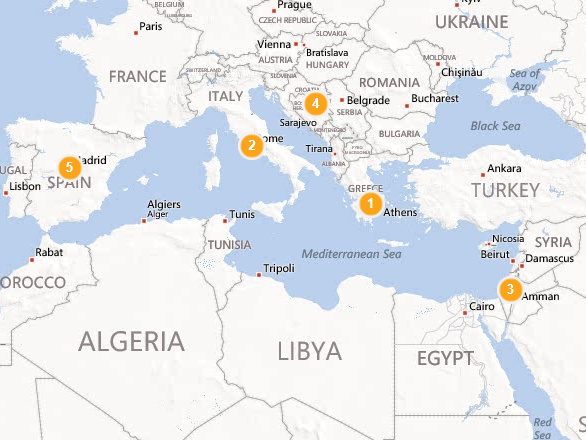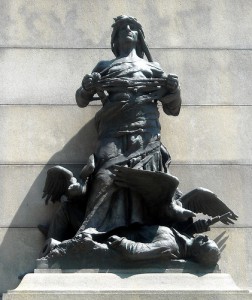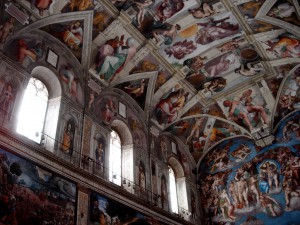22This is the reason why I have so often been hindered from coming to you. 23But now, since I no longer have any room for work in these regions, and since I have longed for many years to come to you, 24I hope to see you in passing as I go to Spain, and to be helped on my journey there by you, once I have enjoyed your company for a while. 25At present, however, I am going to Jerusalem bringing aid to the saints. 26For Macedonia and Achaia have been pleased to make some contribution for the poor among the saints at Jerusalem. 27For they were pleased to do it, and indeed they owe it to them. For if the Gentiles have come to share in their spiritual blessings, they ought also to be of service to them in material blessings. 28When therefore I have completed this and have delivered to them what has been collected, I will leave for Spain by way of you. 29I know that when I come to you I will come in the fullness of the blessing of Christ.
Most believe that Paul wrote this letter from Corinth. He has longed for years to visit the Roman church, but has been preoccupied with his work “from Jerusalem and all the way around to Illyricum” (v.19). He is a frontier missionary church planter and so he must forsake good, desirable things to stay on task. But now that he’s satisfied with is work in this region, he’s ready to move forward to Spain and plans to stop by Rome on the way. As you can see by the map below, this makes sense:
- 1 = Corinth
- 2 = Rome
- 3 = Jerusalem
- 4 = Illyricum
- 5 = Spain
However, what he says in verse 25 makes no sense. “At present, however, I am going to Jerusalem bringing aid to the saints.” What??? This goes against his holy ambition to head to new territories with the gospel (v.20). This takes him way out of the way on his journey to Spain, in an age when travel is painstaking. And on top of all that, this is a dangerous because the Jews in Jerusalem want him dead (v. 30-31).
There is something important about this gift. He focuses two chapters on it in 2 Corinthians (8&9) and there gives a lot of reasons that the gift is important. Here’s a super-brief outline of them:
- It’s an overflow of the givers’ joy (v.8:2)
- It’s proof of their genuine love (8:8)
- It’s an act of fairness (8:14)
- It’s about sewing and reaping (9:6)
- It produces thanksgivings (9:11)
- It supplies for a real need (9:12)
- It glorifies God (9:13)
All this is true, but here in Romans 15 Paul doesn’t mention any of that. He only mentions one factor that makes this gift important: it’s connection to Jewish-Gentile relations. Look again at verses 26-27,
26For Macedonia and Achaia have been pleased to make some contribution for the poor among the saints at Jerusalem. 27For they were pleased to do it, and indeed they owe it to them. For if the Gentiles have come to share in their spiritual blessings, they ought also to be of service to them in material blessings.
This gift is from Gentile believers to Jewish believers. Remember, Paul is writing to a church that includes both, and perhaps the main point of the letter is to create unity among them. Uniting Jewish Christians, with their rich heritage and tradition as God’s people, with Gentile Christians, with their pagan background, was no small task. How much easier it would have been for Paul to just create two denominations, the JCs and the GCs. But he didn’t. Instead, he broke his back to bring them together. And that is what this gift is about.
Why is this so important?
If you read through your Bible you’ll notice that phrases like this show up often, “every tribe, tongue and nation.” When Jesus gave the Great Commission in Matthew 28, he told his followers to make disciples of whom? “All nations.” Indeed Jesus brings together his people “from every tribe and language and people and nation” (Revelation 5:10). It is in this diversity that our unity glorifies God the most.
Think of your favorite band. At their concerts you’ll find a limited variety of people. Country musicians mainly draw country music fans. Hip hop artists mainly draw hip hop fans. But God draws people from every conceivable culture and subculture. He’s that glorious.
My grandfather wanted desperately for his children and grandchildren to go to the annual Broadway family reunion. Since my father never made it a priority, I haven’t either. I never understood why he wanted us to go so badly. I think now that it was something of God’s image reflected in him. It’s natural to want your family to be together. God is this way. He wants his family, drawn from every tribe, tongue and nation to be together in unity.
Discussion Starters
- Read the passage together.
- Paul was clear on his part of the Great Commission. He was to establish churches in new territories. Are you clear on your part? If so, what is it? If now, how can you become clearer about it? What are some different ways every-day Christians like us can work to make disciples of all nations (Matthew 28)?
- Read verse 22-24 again. Paul had to forgo good and desirable activities so he could focus on his calling. What activities do you need to consider as conflicting with your calling, even though they may be good and desirable in of themselves?
- What is the principle at work in verse 27? Does it apply to other situations? Are there any people groups or churches that we should consider helping in some way?
- What does it mean to come to someone “in the fullness of the blessing of Christ” (v.29)?
- What are some practical ways we can, as individuals and as a church, love our brothers and sisters who are different from us?







